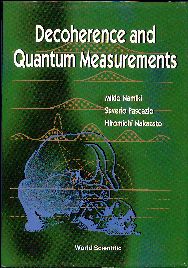
Decoherence and Physical Measurements
Mikio Namiki, Saverio Pascazio, and Hiromichi Nakazato
World Scientific, 1999, 228 pages

|
 ecoherence of entangled states is no longer
just an academic exercise for particle physicists. The fact that an
observer can change the outcome of a measurement may be the first
clue about how to integrate subjectivity into our mechanistic view
of the universe. Thus, this problem has received attention from
biologists and brain scientists as well.
ecoherence of entangled states is no longer
just an academic exercise for particle physicists. The fact that an
observer can change the outcome of a measurement may be the first
clue about how to integrate subjectivity into our mechanistic view
of the universe. Thus, this problem has received attention from
biologists and brain scientists as well.
After a highly abbreviated (and almost incomprehensible) review of quantum mechanics, the authors present their unique ideas about decoherence and measurement, and contrast them with the theories of Wigner and von Neumann. In essence, their approach is to modify the Wigner-von Neumann equation that describes wave function collapse by including an additional term for the state of the detector. They introduce a new "decoherence parameter" that allows a continuous degree of decoherence, and formulate these ideas in terms of multiple Hilbert spaces.
The authors' earlier work was criticized for taking the phenomenological collapse in the microscopic system too literally, and disregarding the state of the measurement device in their theory. This is important because the interaction with the measurement device is what defines an observable. This book describes how these physicists addressed this problem. It goes without saying that a familiarity with the equations and concepts of QM is essential for understanding this book.
